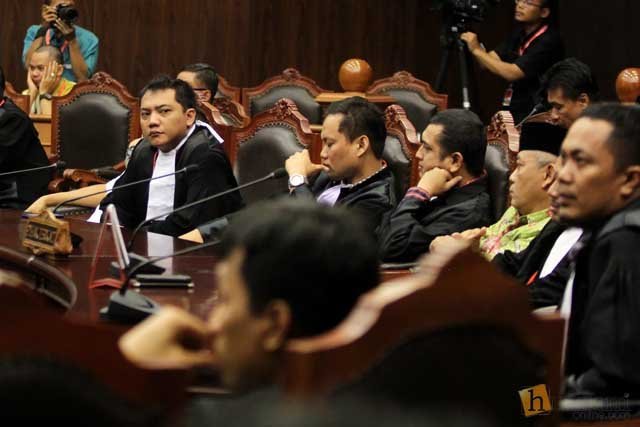The Public Must Support the Election Dispute Hearing Process at the Constitutional Court
By: Putera Marasabessy*
The Constitutional Court (MK) is ready to begin the trial process for the 2024 Pilkada Results Dispute (PHP) on January 8, 2025. With a total of 314 applications received, this trial is one of the important moments in the journey of democracy in Indonesia. As a society that loves democratic values, we have a moral responsibility to fully support this process. This support can be manifested in various forms, from maintaining order, respecting the legal process, to trusting the results determined by the MK.
The Chief Justice of the Constitutional Court, Suhartoyo, said that his party had prepared everything to handle the Pilkada dispute case. This preparation includes updating procedural regulations, technical legal training, and modernizing trial facilities. These steps demonstrate the Constitutional Court’s commitment to ensuring that the trial process is transparent, fair, and professional. Therefore, the public needs to give full trust to this institution to carry out its duties in accordance with the constitution.
In addition, the General Election Commission (KPU) as the defendant in this dispute also showed thorough preparation. The KPU has formed a special legal team and issued technical guidelines for resolving disputes over the results of the regional elections. This preparation was carried out to ensure that every lawsuit filed can be answered substantively and administratively. KPU member, Idham Kholik, emphasized that his institution is committed to upholding the results of the regional elections that have been determined according to legal procedures. Thus, the public does not need to doubt the credibility of the KPU in dealing with this dispute.
Pilkada dispute hearings are often in the public spotlight because the results have a major impact on regional government and political stability. Therefore, the Coordinating Minister for Law, Human Rights, and Immigration, Yusril Ihza Mahendra, reminded all parties to respect whatever the Constitutional Court’s decision is. The Constitutional Court’s decision is final and binding, so there is no room for any party to intervene or reject the results that have been determined. This message needs to be a guideline for the public so that they are not provoked by narratives that doubt the legitimacy of the Constitutional Court’s decision.
The role of the community in supporting this trial process is very important. First, the community must maintain order and not be involved in actions that have the potential to disrupt the trial process. Second, moral support for the Constitutional Court and the General Elections Commission must continue to be echoed to ensure that these institutions can work without pressure. Third, the community needs to increase legal literacy so that it is not easily influenced by inaccurate information related to the trial process.
Constitutional Justice Enny Nurbaningsih explained that the Constitutional Court has formed three panels to handle the Pilkada PHP case. This division was carried out to ensure that the court process runs efficiently and avoids conflicts of interest. This step is proof that the Constitutional Court is committed to maintaining its integrity and independence. Therefore, the public needs to support this effort by not spreading speculation or baseless accusations against the ongoing process.
Pilkada is one of the pillars of democracy that provides an opportunity for the community to elect regional leaders. However, the results of the Pilkada are not always accepted by all parties, so the dispute resolution mechanism through the Constitutional Court is very important. This process not only provides justice for the disputing parties but also strengthens public trust in the democratic system. Therefore, public support for this process is a real form of responsible democratic participation.
In this context, the public also needs to be wise in responding to the final results of the trial process. Dissatisfaction with the results of the regional elections should not be used as a reason to create political or social instability. Instead, the public must accept the Constitutional Court’s decision as part of a healthy democratic process. This attitude will help create a conducive political climate and support regional development.
In the context of maintaining smoothness, the public needs to refrain from actions that can disrupt stability. Unorganized demonstrations, the spread of hoaxes, or provocations on social media must be avoided. Instead, the public is expected to be an example in supporting the supremacy of law by encouraging all parties in dispute to comply with applicable legal mechanisms.
Security during the trial process is also a shared responsibility. Security forces have been given a mandate to ensure the situation remains conducive, but the community also has an important role. By not creating potential horizontal conflicts and maintaining harmonious communication between support groups, the community can help reduce potential tensions.
Ultimately, public support for the Pilkada dispute trial process at the Constitutional Court is not just about giving trust to the institutions involved. More than that, it is about showing our commitment as a nation to the principles of democracy and the supremacy of law. By supporting this process, we contribute to maintaining political stability and strengthening the democratic system in Indonesia. Therefore, let us together be part of the effort to realize a quality and just democracy. Together we realize a trial process that reflects the spirit of togetherness and maturity of democracy.
*The author is a Political Science student
